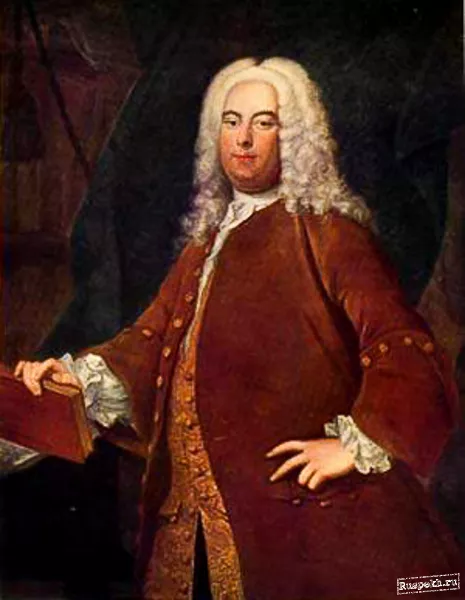
GEORG FRIEDRICH GENDEL
(1685-1759)
Georg Friedrich Gendel is a German and English composer. One of the greatest composers of the 18th century, his oeuvre (I.S.Along with Bax’s work) meant the peak of Western European musical Baroque, which at the same time became its end.
The composer was born in Galle on 27 February 1685 to a barber family. From an early age, he showed an amazing talent for music. He was the organist and composer F.V.Saxau studied under, in 1702 acting as organist at the Calvin Church of Galle. From 1703, he continued his career as a soloist (Second Violinist, then harpsichordist) in the orchestra of the Hamburg opera Theatre. In 1705, in this theater, he made his debut as a composer with the Opera “the changing happiness of the crowned John Almira, Queen of Castile”. The success of these and recent operas, “Love earned by blood or Crime-yohud Nero” (1705), is attributed to G.F.Gendel was invited to Italy.
During his 3 years in Italy (autumn 1706 to early 1710), G.F.Gendel visited major cities, became known as a virtuoso harpsichordist. Notable art masters (a.Corelli, A.Scarlatti and D.Scarlatti) and mastered the most important composing genres of contemporary Italian music within the short furnsat. The sublime skill of writing music for Italian texts found its vivid expression in operas such as “Rodrigo” (1707, Florence) and “Agrippina” (1709, Venice), in the oratorio “The Celebration of time and despair” (1707, Rome), as well as in many solo cantatas.
In 1710-1716, G.F.Courfurst of Gendel – Hanover was a court capelmeister, holding positions at the court of King Georg I of England in 1714, and therefore taking turns living in Hanover and London. The premiere of the composer’s opera “Rinaldo”, which saw the face of the stage in 1711, was a great success. In recent years, 4 more operas by the composer have been staged: “the faithful shepherd” (1712), “Theseus” and “Sulla” (both – 1713), and “Amadis” (1715). At the end of 1716 he finally moved to England, where he would spend most of his life (in 1727 he obtained British citizenship). In 1717-1718 he was in the service of James Bridges (Earl of Carnarvon, later Duke of Chandos), mastering distinctive English musical genres (the mask of”Atsis and Galatea” and 11 famous “Chandos hymns” date from this period).
G.F.The heyday of Gendel opera production dates back to 1720-1728, when the composer was employed as musical Head of the Royal Academy of music. His masterpieces were staged at the same time: “the Radamist” (1720), “Tamerlane”, “Julius Caesar” (both 1724), etc. Despite the Academy’s financial crisis in 1728, during the 1729/1730 season, G.F.Gendel continued to stage operas at Holda, which attracted new singers. The opera House would close in 1728, as it could not cope with financial difficulties.
G.F.A difficult period had begun for Gendel. He repeatedly tries to create a theater, and in the hope of this goal makes trips to Italy. All these problems undermined his health. In 1737, the right side of his body becomes paralyzed. The composer, however, creates without interrupting his career.
In 1738, the composer wrote The Opera “Xerxes”, but the subsequent opera “Deydamia” (1741) was a failure, and the composer was not written by another opera. The main focus is on G.F.Gendel focuses on the oratorio genre, in this genre he fully expresses his creative genius. Among the highest and sara examples of the genre are the oratory “Saul” and “Israel in Egypt” (both 1739), “Messiah” (1742), “Samson” (1743), “Iuda Mccaway” (1747), and “Iyevfay” (1752). In addition to the oratorios, G.F.Gendel created about a hundred cantatas, and for Orchestra 18 concertos united under the title “major concertos”.
Beginning in 1752, G.F.Gendel’s vision deteriorates greatly and in the last years of his life he becomes completely blind. Nevertheless, the composer did not stop creating. The last concert in which the oratorio “Messiah” was performed under his direction was G.F.It was organized and held eight days before Gendel’s death. The composer died in London on 14 April 1759.
